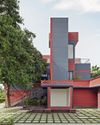
India has witnessed some of the hottest pre-monsoon months since the beginning of the last century. Recorded land surface temperatures cross 50 degrees regularly, the latest being when the national capital hit 52.3 degrees Celsius last week. Fluctuations in rainfall have led to droughts, water scarcity and floods – with many areas being floodaffected, as seen in Manipur and water shortage affecting urban cores of Bengaluru, Chennai etc. But, unfortunately, we are not discussing these crises with as much attention as they merit.
Over the past few years, it has become quite clear that sustainability in the built environment has to go beyond the formulaic approaches of green building certification programs, and instead needs to tackle water resource issues along with seriously reducing cooling and heating demands. This requires carefully reevaluating planning and building technologies that planners and designers use.
NEED FOR DATA AND ANALYSIS
A significant challenge in master planning in India stems from insufficient data, a lack of technical expertise, and a generally noncomprehensive planning process. In the absence of 2021 census data, it is estimated that India today has over 10,000 towns and cities, most of which lack efficient master planning. Although progress has been made with GIS-based master plans, these documents often lack pertinent analyses and recommendations for water management. Typically, mapping and identifying catchment areas, channels, urban water bodies, rivers, and floodplains, should inform land-use recommendations and delineate conservation zones within a region.
هذه القصة مأخوذة من طبعة June 2024 من Architecture + Design.
ابدأ النسخة التجريبية المجانية من Magzter GOLD لمدة 7 أيام للوصول إلى آلاف القصص المتميزة المنسقة وأكثر من 9,000 مجلة وصحيفة.
بالفعل مشترك ? تسجيل الدخول
هذه القصة مأخوذة من طبعة June 2024 من Architecture + Design.
ابدأ النسخة التجريبية المجانية من Magzter GOLD لمدة 7 أيام للوصول إلى آلاف القصص المتميزة المنسقة وأكثر من 9,000 مجلة وصحيفة.
بالفعل مشترك? تسجيل الدخول

A GRECIAN RETREAT
Shimona Bhansali imbues a subtle touch of opulence to this home in Mumbai

A BOLD STATEMENT
Dhampur Sugar Mills Limited's workspace in New Delhi designed and built by Officebanao adopts an industrial narrative

A BREATH OF FRAGRANT DESIGN IN DELHI'S HEART
An office that smells like perfumery; that is the vision that TWI brought to life in this office space designed for an acclaimed perfume company in India

MASTER OF ALL TRADES
The ethos of forward-thinking and ingenuity finds its architectural counterpart within the walls of Nikhil Kamath and Abhijeet Pai's office-a vision of organic design infused with the essence of India

A TOUCH OF OPULENCE
Designed by Aparna Kaushik, this Delhi office displays an interesting balance of classic aesthetics and contemporary sensibilities

THE WOODEN WONDERLAND
Priyanka and Piyush Mehra envision a stunning experience centre for Vikas Plywood

THE HUB: BUILDING COMMUNITIES
Studio Lotus designs a dynamic mixed-use community hub that activates Chennai's largest IT Park

THE WINNER'S PERCH
Baldiwala Edge designs a Singapore-based ship broker's office as a torch collector's paradise, offering a 360-degree bird's-eye view of the Mumbai skyline

THE DIRECTOR'S CABIN
Designed by Envisage, this office gives a new definition to the traditional notion of biophilia

Designing Corporate India
From weaving the magic of a Star Trek-themed command centre to crafting bespoke block-printed workstations, Vijaya Bhargav and Arnab Ghosh-the trailblazing co-founders of Ostraca-have astonishingly transformed a staggering 29 million square feet of office space for India's tech giants and global enterprises-all while maintaining a flat hierarchical company culture-fuelling a master class in corporate design